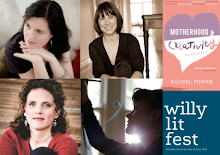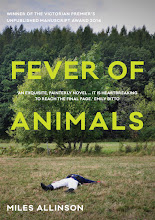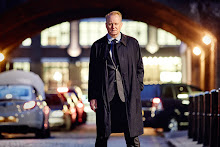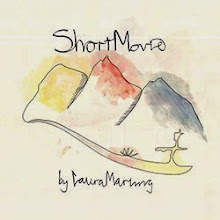
When I first spotted
this article about French feminist
Elisabeth Badinter, I thought perhaps finally someone had put words to a largely unarticulated feeling I’ve had for a while: that in the push to reassert the value of mothering, a very self-sacrificial model of motherhood has re-emerged.
(The time it has taken me to get round to writing this ridiculously long post could be proof of Badinter’s point!…)
But in reading the article, although some of her arguments are sound, I think she has the wrong targets in her sight. And more than that, I couldn’t help feeling that her ideas are a denial of all that’s lovely about parenting.
For those who haven’t read the article (Badinter’s new
book isn’t available in English yet), the central gist of her argument is that the rise of a new version of the “good mother” is creating unforseen levels of guilt and self-sacrifice among women.
A “subterranean ideological war” is how Badinter describes the push for so-called “natural” mothering, which she associates with breastfeeding, co-sleeping, the use of cloth nappies and other “masochistic” practices.
Ecologists, breastfeeding advocates and paediatricians are responsible for this return to “naturalism”, depriving couples of their sex life and even driving down birthrates, she says.
There is no doubt that when it comes to modes of mothering, there have been strong trends over the years — ranging from foolish advice to sinister attempts to control women’s behaviour.
But blaming breastfeeding “zealots”, the environmental movement and even babies themselves (mothers' "Great Oppressor" is how Badinter describes them) seems misguided to me. Sometimes it’s a case of weighing up a baby’s wellbeing against a mother’s sanity, certainly, but I would say there is now a pretty solid consensus on the benefits of breastfeeding that isn’t just a disguise for pushing women back into the home.
Badinter is speaking to women, like herself, who can afford wet nurses and nannies. Breastfeeding troubles aside, bottle-feeding can only liberate a mother in the way she describes if there’s someone to hand the bottle over to.
As for ecologists, I get very tired of the idea that environmentalists have some vested interest beyond the survival of humanity and the planet. It's hardly fun to be peddling the notion of our impending self-annihilation. (Just a little communist plot to drive us all backwards…) For Badinter’s generation, baby formula and disposable nappies might have been among the keys to liberating mothers. Now many of us are recognising them as part of a deeper crisis.
(And we know that milk powder has hardly proved liberating for third-world women, where far more horrific motives were at work in its introduction, with tragic results.)
For Badinter, feminism has always meant aiming for equality with men in terms of sharing in their privileges. But since the 70s, women (and some men) have begun to question many of the values attached to those apparent privileges. It has perhaps been one of the greatest surprises for older generations of feminists that, given the choice, many educated mothers are actively choosing to stay at home or work part time.
Rather than blind allegiance to fashion, could it not be women’s own instincts that are driving the take-up of natural birth, co-sleeping, staying at home during the early years and other forms of “attachment” parenting, at least in part?
The difference now — and this seems to be what Badinter fails to recognise — is that for most middle-class women, these are often active, informed choices rather than the result of a lack of options or a response to society’s expectations.
And many women are embracing motherhood as a significant part of their identity — for good reasons, as it is one of the few truly transformative experiences in life, and offers a unique opportunity for self-knowledge.
That said — yes, we’ve all seen examples of attachment parenting gone too far, where parents have failed to set the kind of boundaries that children and, arguably, parents need. But are these really the majority?
Surely the fact that twice as many women are childless now as were 30 years ago has more to do with a mix of choice, birth control and circumstances than an increase in fear about what mothering will entail.
So what does this mentality shift (which I agree with Badinter exists) represent? Is this move to more intensive modes of mothering about informed women making choices that match their instincts? Or is it driven by guilt? Part of a backlash against feminism’s “false” promise that we could have it all?
Worse, in trying to have it all, have women decided it’s just all too hard? That the lack of real choices is causing them to fall back on the path of least resistance?
Another question: is the pressure educated families now feel to run a sustainable household (food gardens, shopping locally…, i.e. time-consuming) falling at the feet of women? (For another post, perhaps…)
The pendulum is definitely still swinging...
Badinter may have children (three, in fact) but the tone of her argument has the same whiff of repulsion as her mentor's, Simone de Beauvior, who couldn’t even stand the sight of a pregnant woman.
While I wouldn’t have minded outsourcing the hours I’ve spent combing nits out of my children’s hair or the endless loads of washing that form like a monster in the corner — and though I am frequently frustrated by the lack of time for my own interests — I wouldn’t actually choose a more distant relationship with my children, a la the French model, even if I could afford one (in the form of a nanny).
Therein lies the bind for so many mothers.
In a sense, Badinter is suggesting that if you want to be truly liberated, you have no choice but to be a “mediocre” mother”. But most women don’t want to have to choose between being an involved parent, being engaged in meaningful work and being an active participant in public life — let alone having strong relationships and creative lives.
As Badinter says, the French have got it right with their state-funded crèche system. Whatever you think of her idea that the state makes up for men’s “deficiencies” (clearly French women gave up on men long ago, if Badinter is anything to go by), it is a system that respects women’s right to selfhood.
Surely there is an argument for progressive naturalism? In a form that doesn’t negate women’s independence and self-realisation.
As Christy outlines so eloquently
here, in targeting children as the "tyrants" holding women back, Badinter lets the real culprits off the hook — that is a state and economy that still fails to properly support women's needs and rights.
I have whacked this out, and it's a bit of an immediate reaction to the tone of Badinter's argument. I also have a lot of sympathy for some of her warnings... But that will have to keep for a later post...






















